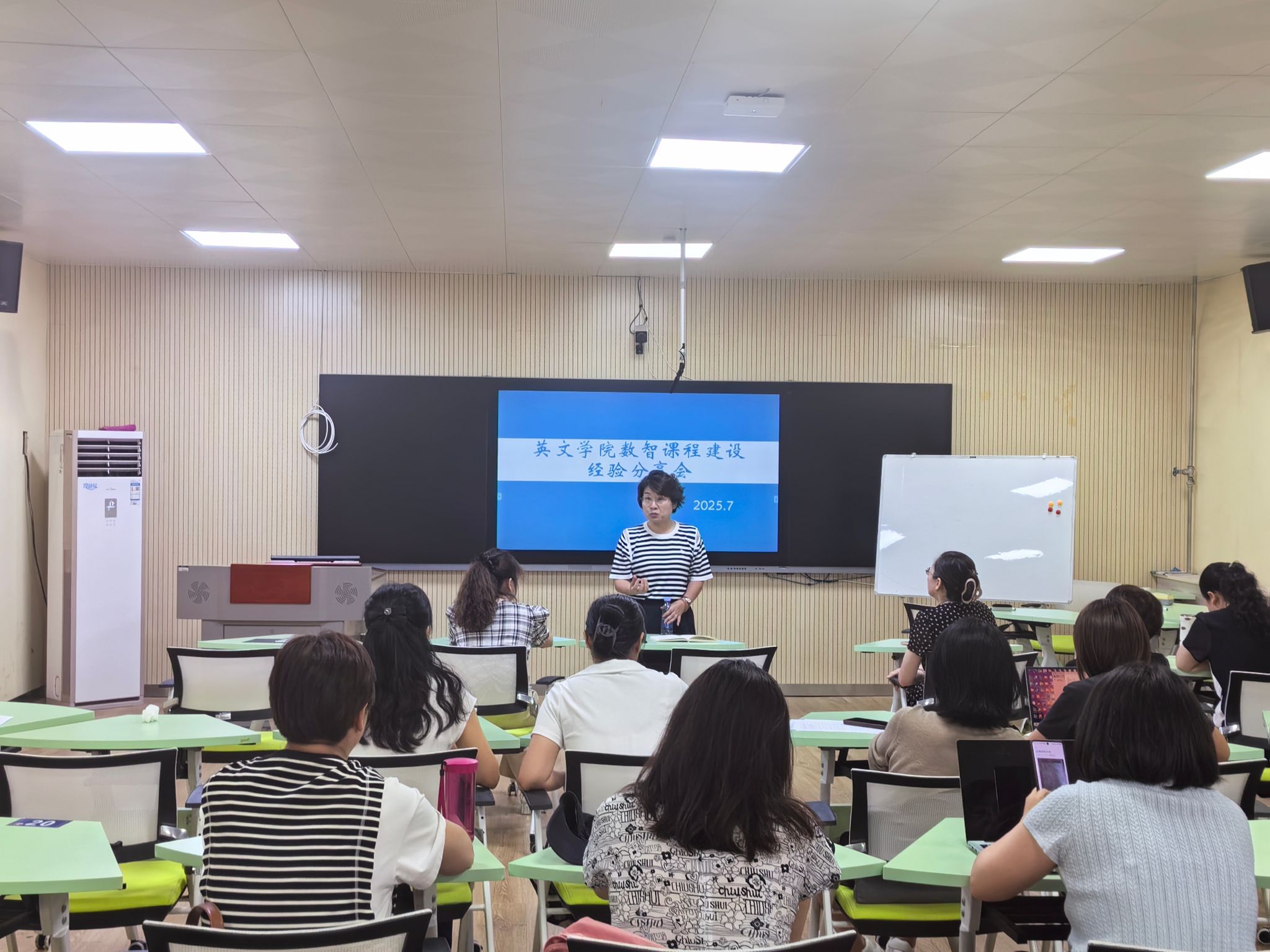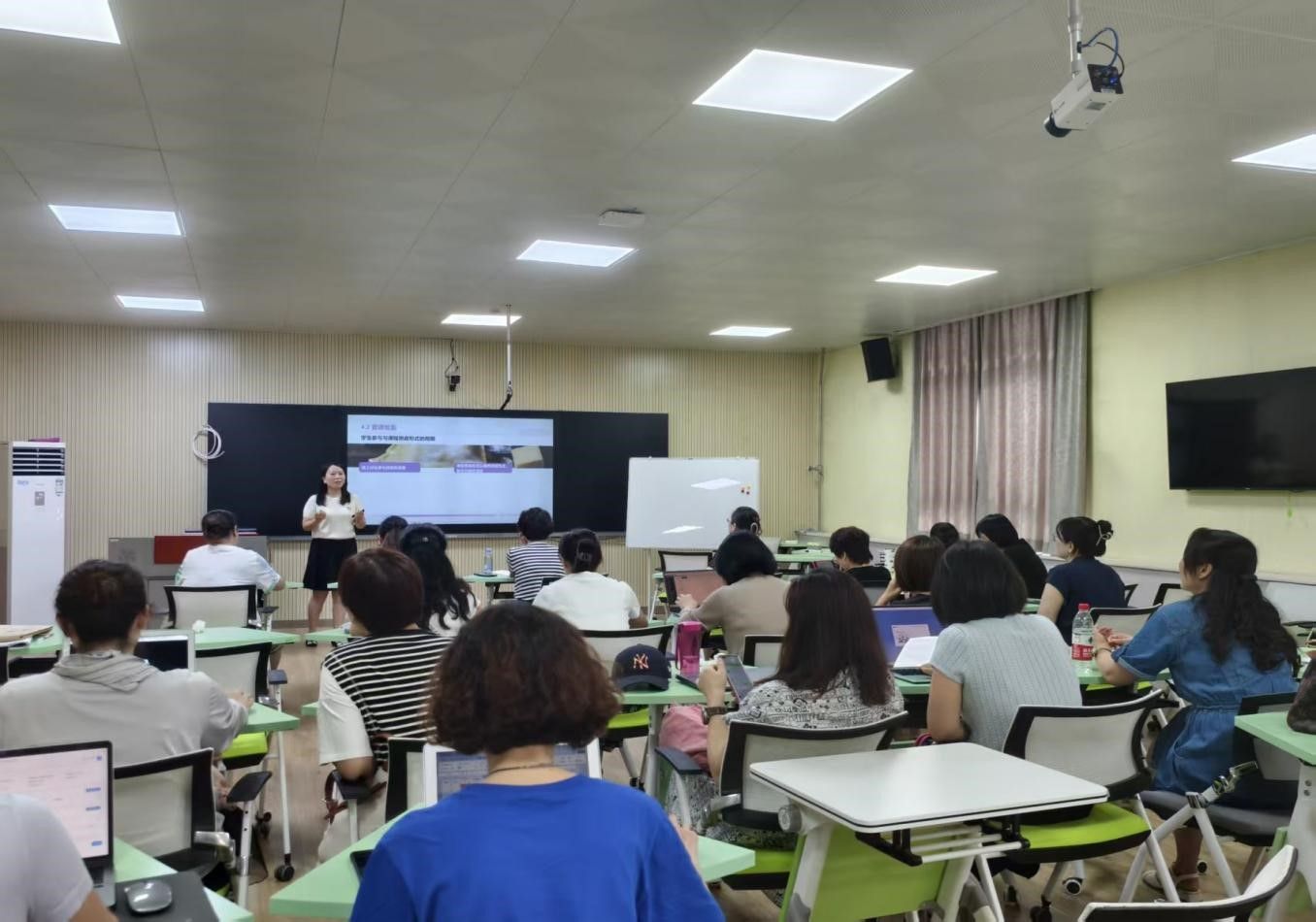To align with the trend of educational digitalization and explore the path for the in-depth integration of digital intelligence technology and English teaching, School of English held an experience sharing session on digital intelligence course construction in Classroom 2401 on the morning of July 3, 2025. The event featured presentations by the leaders of four courses: Translation Theory and Practice, College English (Liberal Arts & Sciences), Selected Readings in British and American Literature, and Advanced English. It focused on the necessity of digital intelligence course construction, the process of building a smart teaching environment, and key challenges in course development. The event was chaired by Zhang Juan, Head of the College English Department. Li Yan, Vice Dean for Teaching of the School of English, and Jian Shi, Assistant Dean, attended the session, along with numerous key faculty members from various departments.
The session began with Luo Fei, Head of the Translation Department, sharing experiences in building the digital intelligence course for Translation Theory and Practice. She explained how Zhihuishu Platform was used to integrate teaching activities and content, leverage digital intelligence technology to precisely match teaching resources with student needs, provide personalized learning guidance and feedback, and utilize data analytics to understand student progress and adjust teaching strategies promptly. She also noted that the course construction is still in an exploratory phase and requires long-term commitment and continuous improvement.
Next, Yin Haixia, leader of the College English (Liberal Arts & Sciences) course, elaborated its construction process. Supported by Chaoxing Platform, the course underwent a digital intelligence restructuring centered around dimensions like technology, career, culture, and life. It breaks traditional course boundaries by integrating resources and innovating models, using digital intelligence as a link to connect knowledge modules. This helps students build a systematic and diverse English knowledge system and cultivates interdisciplinary comprehensive literacy.
Subsequently, Li Qian shared experiences in building and implementing the digital intelligence course for Selected Readings in British and American Literature. Demonstrating with her "Intelligent Painting Class: Situational Teaching Cases," she showed how AI tools like chatbots, AI-generated illustrations, and text-to-speech can recreate literary scenes, illustrating how digital intelligence technologies create immersive teaching scenarios. Additionally, practices using AI for literature analysis to distill academic viewpoints effectively cultivate students' academic literacy. On the whole, digital intelligence tools bring both humanistic depth and technological vitality to British and American literature teaching.
Finally, Professor Li Ran from Advanced English course introduced in detail that the Advanced English team used the "knowledge graph" function of the platform to sort out the complex grammatical structures and rhetorical knowledge in Advanced English, helping students build a systematic knowledge system; and combined with AI text analysis tools to diagnose the logical framework of students' writing and provide optimization suggestions. She also pointed out that there are problems to be solved in the current course construction, such as insufficient use of online resources by students and difficulties in implementing high-level thinking training.
Following the presentations, Vice Dean Li Yan delivered concluding remarks. Dean Li first affirmed the dedicated efforts of all teachers involved in digital intelligence course construction. This sharing session showcased diverse pathways for the deep integration of digital intelligence technology with English courses. She encouraged faculty to continue exploring the potential of platforms like Zhihuishu and Chaoxing to promote the intelligent and personalized development of English courses. All teachers should adapt to the trend and translate concepts into practice. Moving forward, the School of English will persistently deepen digital intelligence course construction, integrating these technologies throughout the entire English teaching process to drive high-quality development in English teaching and cultivate talent suited for the new era.
Lastly, Assistant Dean Jian Shi noted that both the quantity and quality of the college's teaching reform project applications have significantly improved this year, reflecting the faculty's enthusiasm and efforts to enhance teaching quality. She expressed hope that more teachers would secure higher-level teaching projects in the future and assured that School of English would continue to support teachers' scientific research and teaching research work.
Correspondent: Wu Jun

